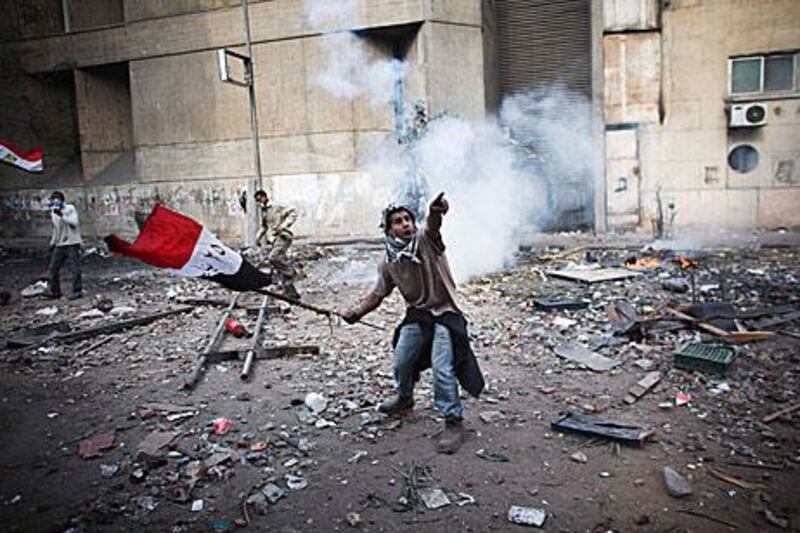CAIRO // Egyptian political parties were yesterday considering requesting a delay in next week's parliamentary elections as thousands of protesters in Tahrir Square held their fifth straight day of demonstrations.
The idea of pushing back the long-awaited elections, which were due to begin Monday, came after tens of thousands of people in the square and at other gatherings around the country appeared to reject concessions announced by the ruling military council on Tuesday night. The concessions, to accept the resignation of the cabinet and move up presidential elections to June, came after the generals consulted with top political parties.
"You can't have elections when there is a war in Tahrir," said Samer Soliman, a founding member of the Egyptian Social Democratic Party. "The police can't protect the polls. The military has lost its legitimacy as rulers. Many campaigns have been suspended."
The liberal Wafd and Free Egyptian parties were also discussing whether to ask the military for elections to be temporarily delayed, officials said.
Since Saturday, the stand-off has escalated with the death toll rising to at least 35, while more than 1,700 have been injured in confrontations between protesters and the security forces across Egypt.
Mr Soliman warned that any decision to hold off on the elections for several weeks, or even months, must be made with a political consensus among the parties, or risk an even greater divide opening up between the Islamists and the secularists. The Freedom and Justice Party, founded by the Muslim Brotherhood and expected to win a large portion of seats in the elections, oppose any discussion of a delay as an attempt to undermine the election results.
"If the elections go ahead as planned, it will be a huge problem," Mr Soliman said. "The only groups still campaigning are the Islamists. People will not accept the results unless there is peace and order."
The military was likely to push back against this, but could oblige if a consensus emerged and if they had no other options
After nine months of controlling the country, the Supreme Council of the Armed Forces (Scaf) has found itself transformed in the eyes of the protesters from the guardian of the revolution to the authoritarian power clinging to power. As Field Marshal Mohamed Hussein Tantawi, Scaf's leader, on Tuesday night called on Egyptians to leave the square and allow elections to move forward as planned, protesters jeered and demanded his resignation.
"The bullets have already been shot by the guns," said Tharwat Salah El Din, 30, a magazine editor, in Tahrir Square yesterday. "You can't take them back. It's too late for ridiculous offers."
With several political parties now coalescing against having the elections as planned and protesters resolved to hold firm, the military has been placed in its most difficult predicament yet. The situation in some ways mirrors that of former president Hosni Mubarak, who offered some small concessions to protesters in February but was eventually pushed to resign by the swelling crowds.
The negative reactions to Mr Tantawi's speech could activate another offer he tendered on Tuesday night: to transfer power immediately to a civilian government if supported by Egyptians in a new referendum.
It was unclear when such a vote could be rolled out, but the military could see this as a way of gaining the support of the majority of a population that wants security and a strong hand to guide the country.
All signs yesterday pointed to the military planning to push ahead with elections on time, while trying to put together a new civilian cabinet to ease tensions. A news conference to explain how the elections would be carried out was scheduled for today at 12pm, according to an email sent to journalists yesterday.
The situation in Tahrir Square calmed yesterday afternoon when a group of religious scholars from Al Azhar University, the centre of Sunni Islam studies, negotiated a ceasefire between protesters and police on Mohammed Mahmoud street. The street has been the site of continuous conflict between the two sides since Saturday. Under the agreement, security forces would not attempt to vacate people from Tahrir Square.
But the ceasefire was over by mid-evening, as fires were set, tear gas fired and rocks thrown amid signs that the protesters were hardening their position in the square for a long sit-in. They had trucked in supplies, bedding and new tents. The scene was part-carnival, part-disaster area. Tea and sweet potato vendors jostled alongside young men selling industrial-grade gas masks and goggles and large field hospitals were filled with people suffering from exposure to tear gas and other wounds. Ambulances streamed in and out of the square.
Putting aside the turmoil engulfing parts of the country, Egypt was already seen as barely prepared to pull off elections successfully next Monday. The final lists of candidates has not been completed and millions of ballot papers still have to be stamped by hand. A new law issued by the military on Monday that could ban former members of the National Democratic Party from joining the race could mean more changes to the lists.
There have also been widespread criticisms of the complexity of the election law, requiring voters to both pick individual candidates and select lists of candidates from political parties for two separate districts.
The first round of elections for the lower house of parliament would take place Cairo, Alexandria, Kafr El Sheikh, Damietta and the Red Sea governorates, with the rest of the country following in two subsequent rounds in December and January. Then the upper house would begin the same process, ending in March.





